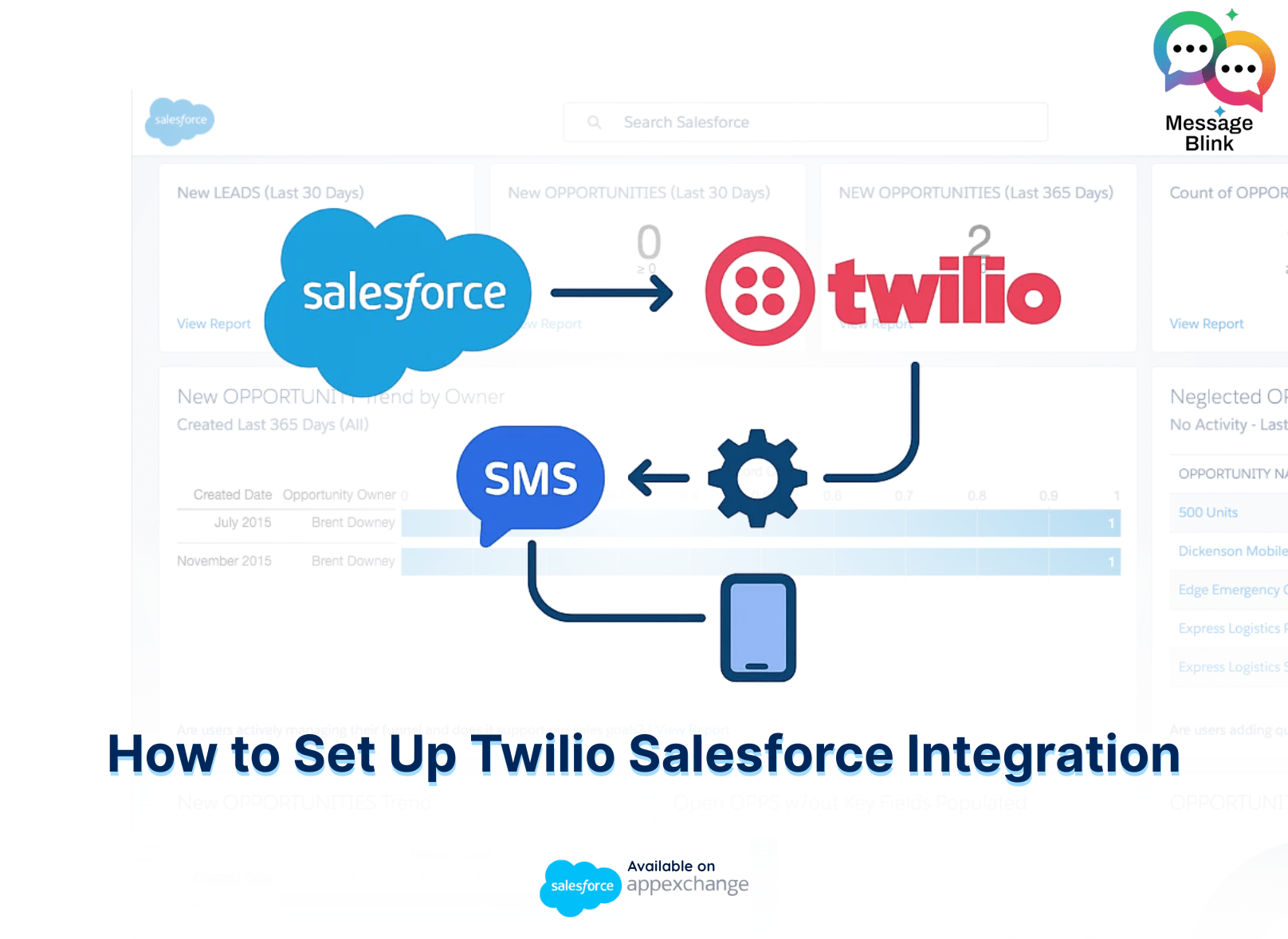If you’re looking to send SMS directly from Salesforce, one of the most common methods is to integrate Twilio with Salesforce. Twilio is a powerful cloud communications platform, and when combined with Salesforce, it unlocks robust capabilities for Salesforce SMS, WhatsApp, voice calls, and programmable messaging.
In this blog, we’ll walk you through everything you need to know about Twilio Salesforce integration, step-by-step setup, benefits, limitations, and how you can simplify the process with apps like Message Blink.
What Is Twilio Salesforce Integration?
Twilio Salesforce integration connects Twilio’s cloud communication services with your Salesforce environment. With this integration, Salesforce users can send and receive SMS messages, initiate WhatsApp communication, and build custom communication workflows directly within Salesforce.
Many Salesforce admins and developers choose to integrate Twilio with Salesforce to enable:
-
Real-time Salesforce SMS messaging
-
WhatsApp conversations inside Salesforce
-
Automation using Process Builder or Flows
-
Trigger-based SMS and alerts to leads or contacts
But while the functionality is appealing, setting up Twilio and Salesforce integration manually requires API knowledge, coding skills, and time.
Why Do Salesforce Users Prefer SMS Integration?
Salesforce SMS is essential for faster customer communication, especially for sales, service, and marketing teams. Whether you’re sending reminders, follow-ups, or promotional messages, SMS ensures higher open and response rates.
Salesforce SMS through Twilio offers:
-
Instant reach to leads and customers
-
Better engagement than emails
-
Two-way texting capability
-
SMS automation from Salesforce Flows
To take full advantage, proper Twilio Salesforce integration is crucial.
How to Integrate Twilio with Salesforce: Step-by-Step
Here’s how Salesforce users can set up Twilio Salesforce integration manually:
1. Set Up Your Twilio Account
-
Sign up at Twilio
-
Purchase a phone number enabled for SMS
-
Generate Account SID and Auth Token
2. Create a Named Credential in Salesforce
-
Go to Setup > Named Credentials
-
Enter Twilio base URL:
https://api.twilio.com -
Provide your Twilio Account SID and Auth Token
-
Set authentication type to “Named Principal”
3. Create an Apex Class to Send SMS via Twilio
-
Use Salesforce Developer Console
-
Write Apex code that makes HTTP POST request to Twilio’s API
-
Specify the
From,To, andBodyfields for the SMS
Here’s a simplified version of what the Apex code might look like:
4. Automate SMS Using Flows or Process Builder
-
Call the Apex method from Salesforce Flows or Process Builder
-
Trigger SMS when a lead is created, a task is assigned, or any custom event occurs
Challenges with Manual Twilio and Salesforce Integration
While the above steps show how to integrate Twilio with Salesforce, there are some limitations:
-
Requires developer support
-
No native interface to view SMS history
-
No WhatsApp messaging unless you build it separately
-
Hard to manage two-way conversations
That’s where no-code Salesforce SMS apps like Message Blink come in.
A Better Alternative: Use Message Blink for Salesforce SMS
Instead of managing the complex Twilio Salesforce integration manually, you can use Message Blink, a Salesforce-native app designed for Salesforce SMS and WhatsApp messaging.
Benefits of Using Message Blink:
-
No code setup
-
Built-in support for Twilio, 360 SMS, and more
-
Works inside Salesforce UI
-
SMS history tracking
-
Bulk SMS campaigns
-
WhatsApp automation
-
Real-time chat inbox
You can still use your Twilio account but without writing Apex code or worrying about APIs.
Why Choose Message Blink Over Manual Twilio Integration?
Here’s a quick comparison:
| Feature | Manual Twilio Integration | Message Blink |
|---|---|---|
| Requires Apex Code | ✅ Yes | ❌ No |
| SMS Inbox in Salesforce | ❌ No | ✅ Yes |
| Bulk SMS Campaigns | ❌ No | ✅ Yes |
| WhatsApp Integration | ❌ Separate setup | ✅ Built-in |
| SMS Automation | ✅ With effort | ✅ Easy |
| UI Inside Salesforce | ❌ No | ✅ Yes |
For Salesforce admins, marketers, and service agents, Message Blink makes it easier to manage Salesforce SMS, while still using Twilio as the backend provider.
Final Thoughts
Whether you’re a developer looking to integrate Twilio with Salesforce manually, or an admin who wants a no-code solution for Salesforce SMS, the end goal is the same — better communication.
For hassle-free setup and extended features, check out Message Blink — your one-stop app for Twilio Salesforce integration, Salesforce SMS, and WhatsApp automation.



